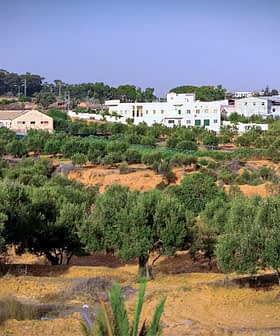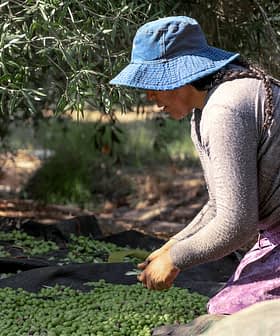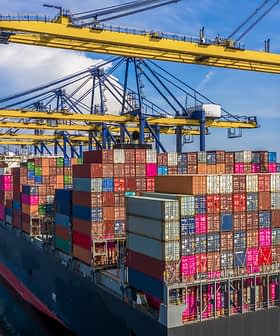Spanish Producers, Policy Makers Explore Strategies for Success in Chinese Market

Despite poor harvests in the Mediterranean basin, olive oil remains in high demand in China, with consumption increasing significantly over the years. Producers are working to promote the health benefits and quality of Spanish olive oil in the Chinese market, emphasizing the need for awareness campaigns and integration into local cuisine to further develop a taste for olive oil in China. Concerns about food safety and the potential impact of trade tensions between Europe and China on agricultural products are also key factors influencing the olive oil market in China.
Even as consecutive years of poor harvests in the Mediterranean basin have led to a dramatic decrease in production, olive oil remains highly sought after in China, particularly from Spain.
Changing eating habits among young consumers in large cities who have traveled abroad and have been exposed to the Mediterranean diet are partly boosting olive oil purchases.
According to International Olive Council data, Chinese olive oil consumption has increased from 12,000 tons in the 2008/09 crop year to 42,500 tons in 2022/23.
The current global geopolitical climate has heightened the risk that food products could be used as a negotiating weapon following the imposition of tariffs by the European Union on products from China.
Still, soybean, sunflower, peanut, and rapeseed oils remain the most common cooking oils in China, readily available at an affordable price and historically used to prepare local dishes.
A recent guide published by Prodeca, a public entity that promotes the Catalan agri-food sector internationally, examined how extra virgin olive oil producers could be more competitive in China’s growing market.
Among the producers with some experience in the world’s second-largest economy is ActelGrup, a Lleida-based cooperative that produces extra virgin olive oil from the endemic Arbequina variety.
See Also:Despite Production Woes, Spain Anticipates Expanding Organic Exports to ChinaThe Catalan cooperative sells its extra virgin olive oil under the Germanor brand in national supermarkets and Romanico for export, but “sales of extra virgin olive oil to China are, to date, occasional and small in volume,” said Fernando Ortega, the cooperative’s sustainability director in charge of extra virgin olive oil and fruit.
While Prodeca emphasized the importance of understanding the Chinese cooking oil market and developing olive oil consumer profiles, the guide added that awareness campaigns should be directed at integrating extra virgin olive oil into Chinese cuisine, providing a healthy improvement to traditional eating habits.
However, Ortega lamented that “there is still a lack of studies focusing on the suitability of integrating olive oil taking into account local culinary customs, as the use of olive oil is closely related to the local diet and culture.”
A taste for olive oil thus needs to be developed further in China. Prodeca suggested that olive oil could be integrated into Chinese eating habits as a starter or salad dressing if the flavor and aroma of a high-quality extra virgin olive oil are to be appreciated.
Prodeca pointed out that many Chinese preparations involve frying food, and olive oil maintains most of its nutritional properties under high-heat conditions.
“Although the taste of olive oil is most appreciated when cold, it is characterized by an excellent resistance to repeated frying and can reach a high smoke point,” Ortega said.
One of Prodeca’s recommendations is for producers and exporters to promote the health benefits of olive oil, especially in the context of food contamination scandals.
Increasing concerns about health in China are expected to significantly impact consumer behavior, with many seeking a guarantee of higher food safety standards from foreign olive oil brands.
In July, a significant food scandal involving trucks transporting cooking oils sparked public outrage in China.
Operators were doing double duty to cut costs, and the trucks were not cleaned between deliveries, cross-contaminating the edible oil with gasoline and other dangerous chemicals.
This case was reminiscent of the 2008 scandal involving milk and baby formula adulterated with melamine, which is toxic in high doses.
“China is a very attractive country for the Spanish olive oil market because of its sales potential,” and “given the amount of food fraud cases, there is food insecurity,” Ortega said.
“For China, the trend is definitely toward an increase in the demand for higher quality extra virgin olive oil,” he added. “What is most important in China at the moment is mentioning the country of origin.”
The Prodeca guide also recommends that producers emphasize geographical quality certifications, such as Protected Designation of Origin (PDO) and Protected Geographical Indication (PGI), which the public entity said could increase willingness to pay.
“What is lacking is a deeper understanding of quality extra virgin olive oil,” Ortega said. “The feeling is that we are 15 years behind the wine sector. Spanish wine regions, including Rioja and Ribera, are well-known worldwide, including China.”
“The European PDO certifying system for olive oil does not have the same recognition and, for the consumer, it does not seem useful as a distinctive element at the time of purchase, as this designation does not clearly define a brand,” he added.
Ortega believes developing an extra virgin olive oil-specific PDO promotion “would require collaboration between the administration and the producing companies, in projects with well-defined objectives.”
One strategy that has helped promote China’s emerging olive oil consumption culture was the sensory analysis courses hosted by the IOC in many Chinese cities in 2019.
“Olive oil tasting events and further promotion in the United States have yielded good results,” Ortega added. “Recent news report that, for the first time, the volume of Spanish olive oil consumption in the U.S. exceeds that of Italian olive oil.”
He said ActelGrup is working to promote olive oil at international food fairs, especially in China.
“Participation in food fairs and the organization of international tastings are very important,” Ortega said. The cooperative’s organic Romanico brand was awarded at a Chinese olive oil competition in 2022.
Ortega emphasized that the Romanico brand is always sold already bottled to China and never in bulk. The Prodeca guide further suggested that bottle sizes and prices can be adjusted to make the product more accessible to price-sensitive Chinese consumers.
“Concerning bottle size, ActelGrup has so far not sold extra virgin olive oil in smaller formats than the usual five-liter, one-liter and 750-milliliter, simply because Chinese importers have not asked for these types of formats,” Ortega said.
Despite a growing domestic industry, Chinese consumers continue to prefer foreign brands. Still, producers are concerned that recent trade tensions between Europe and China could result in retaliation against agricultural products, including olive oil.
“The current global geopolitical climate has heightened the risk that food products could be used as a negotiating weapon following the imposition of tariffs by the European Union on products from China, such as electric vehicles,” Ortega warned.
“In any case, the increase in purchasing power in China is a reality and an opportunity for the Spanish olive oil sector to continue promoting an exquisite and unique product,” he concluded.









